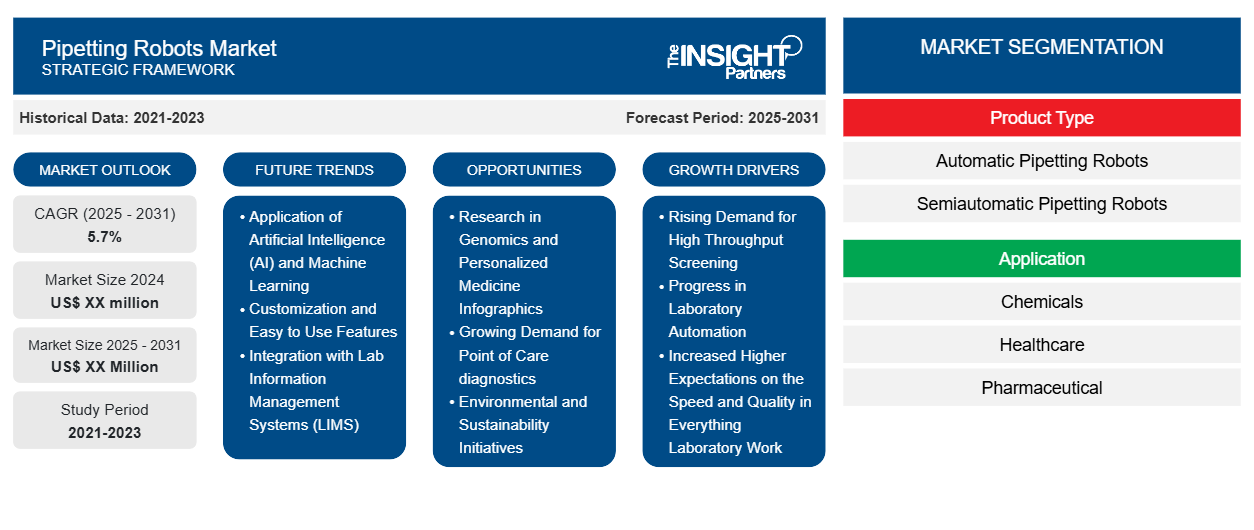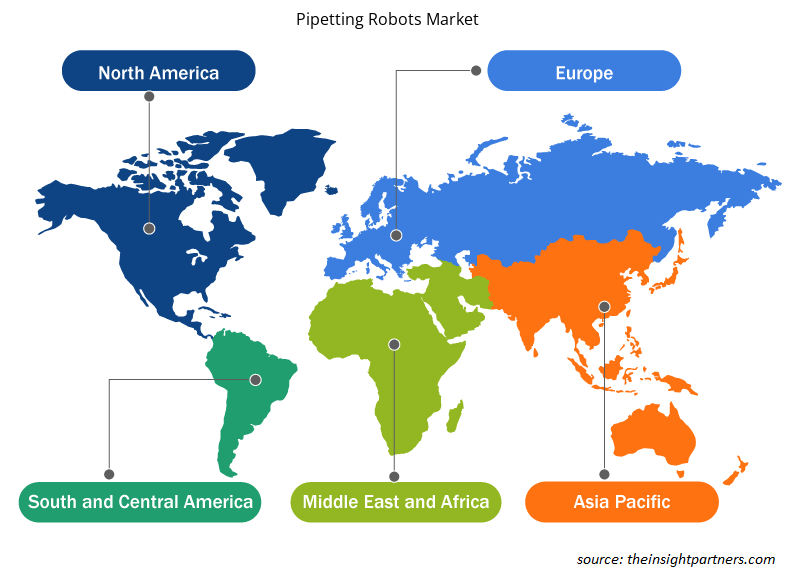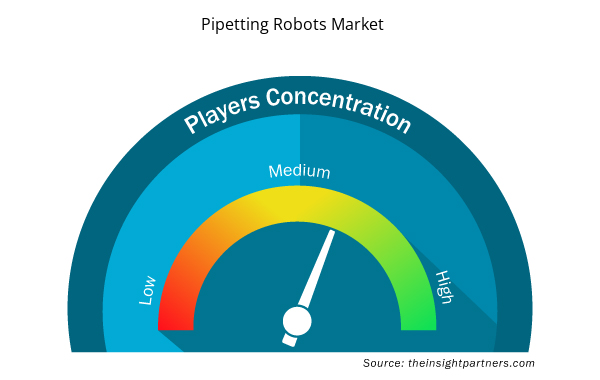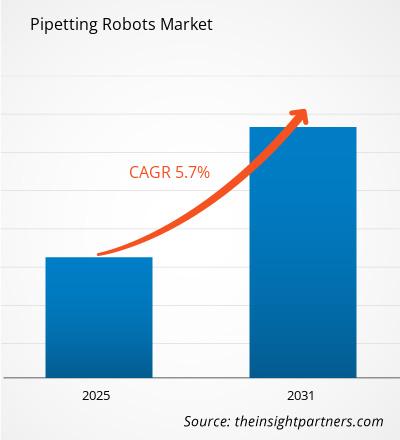The Pipetting Robots Market is expected to register a CAGR of 5.7% from 2025 to 2031, with a market size expanding from US$ XX million in 2024 to US$ XX Million by 2031.
The report is segmented by Product Type (Automatic Pipetting Robots, Semiautomatic Pipetting Robots). The report is segmented by Application (Chemicals, Healthcare, Pharmaceutical, Biotechnology, Others). The global analysis is further broken-down at regional level and major countries. The Report Offers the Value in USD for the above analysis and segments.
Purpose of the Report
The report Pipetting Robots Market by The Insight Partners aims to describe the present landscape and future growth, top driving factors, challenges, and opportunities. This will provide insights to various business stakeholders, such as:
- Technology Providers/Manufacturers: To understand the evolving market dynamics and know the potential growth opportunities, enabling them to make informed strategic decisions.
- Investors: To conduct a comprehensive trend analysis regarding the market growth rate, market financial projections, and opportunities that exist across the value chain.
- Regulatory bodies: To regulate policies and police activities in the market with the aim of minimizing abuse, preserving investor trust and confidence, and upholding the integrity and stability of the market.
Pipetting Robots Market Segmentation
Product Type
- Automatic Pipetting Robots
- Semiautomatic Pipetting Robots
Application
- Chemicals
- Healthcare
- Pharmaceutical
- Biotechnology
- Others
Customize This Report To Suit Your Requirement
You will get customization on any report - free of charge - including parts of this report, or country-level analysis, Excel Data pack, as well as avail great offers and discounts for start-ups & universities
Pipetting Robots Market: Strategic Insights

- Get Top Key Market Trends of this report.This FREE sample will include data analysis, ranging from market trends to estimates and forecasts.
Pipetting Robots Market Growth Drivers
- Rising Demand for High Throughput Screening: The pharmaceutical and biotechnology industries are increasingly dependent on high-throughput screening (HTS) for exploring and evaluating agents in drug development, genetic studies, and clinical trials. Pipetting robots eliminate manual operations by allowing researchers to carry out large-scale studies, that is, work on thousands of samples in a shorter duration than the manual approach. There is a constant upward slope looking for better and faster testing which increases the need for pipetting systems that are automated to help eliminate human error and increase the reproducibility of results.
- Progress in Laboratory Automation: In the last ten years, technologies applied to laboratory automation have been improving at a very fast rate with better robots. In modern practices, robots are becoming cheaper and easier to scale as well as are able to perform complex processes such as pipetting, mixing and preparing samples among others. In clinical research, for example, more of these systems are being integrated into studies as they help in improving productivity, cutting back expenses as well as the chances of occurring faults that would have otherwise been caused by either contamination or an assist. These developments are driving the growth of the market for pipetting robots, as many laboratories today seek to automate certain tasks in order to compete with the exceptionally rapidly changing research landscape .
- Increased Higher Expectations on the Speed and Quality in Everything Laboratory Work: In recent years, the requirements for achieving accurate and repeatable results in scientific and clinical practice have reached the new heights. Manual pipetting, being highly subjective and prone to individual errors, can produce variation in results as well as prove to be lengthy. Pipetting machines on the other hand provide relatively low degree of error and tight adherence to methodology, enhancing data result and storage respectively.
Pipetting Robots Market Future Trends
- Application of Artificial Intelligence (AI) and Machine Learning: AI and machine learning (ML) technologies are anticipated to find their way into pipetting robots to make them better. These avant-garde algorithms improve the precision of the processes by recognizing and learning the behavior of liquid handling and the faults associated with it, improving the process course, or changing the parameters on the fly. Also, AI-based systems enable prediction and resolution of problems leading to increased uptime of systems and reduced dependency on human activity. This is a progression that will definitely continue as the nature of AI improves, thus making pipetting robots even smarter than how they are now.
- Customization and Easy to Use Features: With an increase in demand for automation in different fields, there is also a tendency towards the provision of customizable pipetting systems. Companies are supplying systems which can be modified according to the particular purpose of the user, be it academic, clinical or industrial. The other issue is that touch panels are becoming the norm in the operation of such systems prompting the simpler operation of even the most complex pipetting systems by simple users. This trend is making the market extend its coverage to more of the laboratories and research institutions.
- Integration with Lab Information Management Systems (LIMS): Another critical trend is the connection among pipetting robots and Laboratory Information Management Systems or LIMS and other laboratory management software. The aforementioned allows samples to be tracked and data managed in real-time as well as enabling automated processes to be employed without much hassle. When pipetting robots are integrated with LIMS, laboratories can guarantee accurate recording of data, proper accounting of experimental procedures, and archiving research findings for further analysis thereby enhancing the workflow and adherence to the set regulatory requirements.
Pipetting Robots Market Opportunities
- Research in Genomics and Personalized Medicine Infographics: The rise of personalized medicine as well as increasing interest in genomic research opens up a heretofore underexploited market for pipetting robots. Personalized medicine entails high sample processing capacity and accuracy levels modernization mainly in genomic sequencing and biomarker analysis. In these processes, pipetting robots ensure precision and enhancement of the processes where these robotics are applied. As the appetite for genetic screening, proven therapies, and therapies that take into account individual patient genetic variations keeps rising, pipetting robots will be more and more at the core of these developmental efforts.
- Growing Demand for Point of Care diagnostics: The point: of: care diagnostics market is based on the concept of feverish, much needed, medical testing that can be done without delay and discomfort to the patient. In this context, pipetting robots can be used to aid with patient sample management, reagent dispensing and assays in a point: of: care environment. With more and more point: of: care diagnostics being introduced into hospitals, clinics and diagnostics centers, pipetting robot companies have an increasing option of this segment’s requirement of small efficient and economical designs.
- Environmental and Sustainability Initiatives: Environmental issues and sustainability strategies are bringing changes in the pipetting robots market. Manufacturers are leaning towards developing products that are more environmentally friendly and objectives such as the minimization of waste, reduction of consumption of consumables and energy. These green solutions not only address the global environmental sustainability agenda but target those businesses that want to spend less and cut back on waste emission.
Pipetting Robots Market Regional Insights
The regional trends and factors influencing the Pipetting Robots Market throughout the forecast period have been thoroughly explained by the analysts at Insight Partners. This section also discusses Pipetting Robots Market segments and geography across North America, Europe, Asia Pacific, Middle East and Africa, and South and Central America.

- Get the Regional Specific Data for Pipetting Robots Market
Pipetting Robots Market Report Scope
| Report Attribute | Details |
|---|---|
| Market size in 2024 | US$ XX million |
| Market Size by 2031 | US$ XX Million |
| Global CAGR (2025 - 2031) | 5.7% |
| Historical Data | 2021-2023 |
| Forecast period | 2025-2031 |
| Segments Covered |
By Product Type
|
| Regions and Countries Covered | North America
|
| Market leaders and key company profiles |
Pipetting Robots Market Players Density: Understanding Its Impact on Business Dynamics
The Pipetting Robots Market market is growing rapidly, driven by increasing end-user demand due to factors such as evolving consumer preferences, technological advancements, and greater awareness of the product's benefits. As demand rises, businesses are expanding their offerings, innovating to meet consumer needs, and capitalizing on emerging trends, which further fuels market growth.
Market players density refers to the distribution of firms or companies operating within a particular market or industry. It indicates how many competitors (market players) are present in a given market space relative to its size or total market value.
Major Companies operating in the Pipetting Robots Market are:
- DORNIER-LTF GmbH
- Andrew Alliance
- BioTek
- OpenTrons
- Tecan
Disclaimer: The companies listed above are not ranked in any particular order.

- Get the Pipetting Robots Market top key players overview
Key Selling Points
- Comprehensive Coverage: The report comprehensively covers the analysis of products, services, types, and end users of the Pipetting Robots Market, providing a holistic landscape.
- Expert Analysis: The report is compiled based on the in-depth understanding of industry experts and analysts.
- Up-to-date Information: The report assures business relevance due to its coverage of recent information and data trends.
- Customization Options: This report can be customized to cater to specific client requirements and suit the business strategies aptly.
The research report on the Pipetting Robots Market can, therefore, help spearhead the trail of decoding and understanding the industry scenario and growth prospects. Although there can be a few valid concerns, the overall benefits of this report tend to outweigh the disadvantages.
- Historical Analysis (2 Years), Base Year, Forecast (7 Years) with CAGR
- PEST and SWOT Analysis
- Market Size Value / Volume - Global, Regional, Country
- Industry and Competitive Landscape
- Excel Dataset



Report Coverage
Revenue forecast, Company Analysis, Industry landscape, Growth factors, and Trends

Segment Covered
This text is related
to segments covered.

Regional Scope
North America, Europe, Asia Pacific, Middle East & Africa, South & Central America

Country Scope
This text is related
to country scope.
Frequently Asked Questions
Players operating in the market are DORNIER-LTF GmbH, Andrew Alliance, BioTek, OpenTrons, Tecan, Sias AG Switzerland, Hamilton Company, Hudson Robotics
Automatic Pipetting Robots segment, by product type, dominated the market in 2023.
The Pipetting Robots Market is estimated to witness a CAGR of 5.7% from 202#to 2031
The major factors driving the Pipetting Robots market are:
1. Rising Demand for High Throughput Screening
2. Progress in Laboratory Automation
North America region dominated the Pipetting Robots market in 2023.
Research in Genomics and Personalized Medicine Infographics act as a opportunity for growth of the market in forecast period.
Trends and growth analysis reports related to Life Sciences : READ MORE..
1.DORNIER-LTF GmbH
2.Andrew Alliance
3.BioTek
4.OpenTrons
5.Tecan
6.Sias AG Switzerland
7.Hamilton Company
8.Opentrons
9.Hudson Robotics

 Get Free Sample For
Get Free Sample For